November 15, 2023, Oral Arguments
Stanley (Jeffrey) vs. State
Las Vegas – 11:00 a.m. – Herndon/Lee/Parraguirre
Chasing Horse (Nathan) vs. District Court (State)
Las Vegas – 11:30 a.m. – Herndon/Lee/Parraguirre
Stanley (Jeffrey) vs. State
Docket No. 84957
Las Vegas – 11:00 a.m. – Herndon/Lee/Parraguirre
This is an appeal from a judgment of conviction, pursuant to a jury verdict, of one felony count of lewdness with a minor under the age of 14, and one felony count of luring a minor. ISSUES: Whether (1) appellant was competent to waive his right to counsel and did so knowingly, intelligently, and voluntarily; (2) the prosecution committed reversible misconduct when it elicited prior bad acts testimony; (3) there was sufficient evidence to support the jury’s verdict; and (4) the trial court committed cumulative error.
Chasing Horse (Nathan) vs. District Court (State)
Docket No. 86538
Las Vegas – 11:30 a.m. – Herndon/Lee/Parraguirre
The State charged Nathan Chasing Horse, by way of an indictment issued by a grand jury, with 10 counts of sexual assault of a child under 16, 6 counts of sexual assault, 1 count of first-degree kidnapping, and 1 count of open or gross lewdness, and 1 count of trafficking a controlled substance. Nathan filed a pretrial petition for a writ of habeas corpus, asserting that the indictment should be dismissed for various reasons. The district court dismissed the trafficking charge but denied the petition as to the remaining counts. Nathan now challenges the district court's ruling by way of the instant petition, arguing that the court manifestly abused its discretion in denying his habeas petition because (1) the State gave an unfounded and prejudicial "grooming" instruction to the grand jury, resulting in issuance of an indictment upon less than probable cause, (2) the court erroneously concluded that promises of spiritual help and vague concerns of spiritual consequences can render a victim's decision to engage in sexual conduct nonconsensual, (3) the State refused to present exculpatory evidence to the grand jury, and (4) the court erroneously concluded it had jurisdiction over offenses which occurred wholly outside of Nevada.

